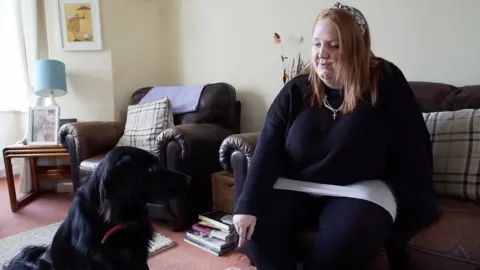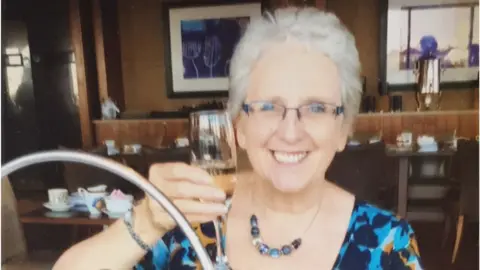Family of MND patient: End assessments for terminally ill
The family of a woman who died from motor neurone disease is calling for an end to a disability benefit assessments for the terminally ill.
Susan Hill was 63 when she died, 18 months after she was diagnosed.
She had applied for personal independence payment (PIP) to pay for carers and underwent what her husband called a "quite degrading" assessment.
The Department for Work and Pensions said it is looking into how it can improve its processes.
Motor neurone disease (MND) is a degenerative condition which can leave patients without the ability to speak, move or eat.
Mrs Hill, who lived in Bargoed with her husband John, had worked with patients with MND and other terminal illnesses in her work as a dietician for the NHS.
She started suffering falls and slurred speech, and suspected she had the condition before diagnosis.
Mr Hill bought and adapted a bungalow for her needs, but she never had the chance to move there before she died in 2018.
He described his wife of over 30 years as "special" and said "she loved her work, she cared for people".
Her daughter, Laura, 26, said she "didn't expect it to be so fast".
"First she lost the ability to talk, and then it was eat and then move and then to the point where she was bed-bound really, with hoists."
She added: "She was really independent. I think that's the worst thing about motor neurone disease, your independence is taken away."

Miss Hill has undergone an assessment herself as she is blind, but said it was different to her mother's situation.
"Mine is life-changing, but I've got the time to go through and wait for the money, whereas terminally ill people haven't," she explained.
During his wife's face-to-face assessment for PIP, Mr Hill said she was asked to do things like balance on one leg.
"It was a bit degrading, certainly in Sue's position," he said.
Miss Hill has started a petition to end these assessments for the terminally ill.
"For any terminally ill person... I think there should be no assessment," she said.
"A medical assessment should be enough."
 family photograph
family photographPIP is available to help with some of the extra costs of long term ill-health or disability.
There is an option for people to be "fast-tracked" and not have a face-to-face assessment if a medical professional says they are not expected to live for more than six months.
Mr Hill said this "didn't seem to be an option" for his wife.
The Motor Neurone Disease Association has said this criterion is difficult to fill by MND patients, as the speed of the condition varies from person to person.
The charity is campaigning for a change in the law, so that terminally ill claimants are not excluded from the fast-track process.
It said: "A person living with a terminal and progressive condition such as MND should be able to access the fast-track claim process under the special rules for terminal illness, which is far more appropriate for their needs than the slow and burdensome standard claim process."
A spokesperson for the Department for Work and Pensions said: "Terminally ill people can get their claims fast-tracked and access benefits without a face-to-face assessment.
"We're looking at how we can improve our processes and in the meantime we continue to work with charities - including MND Association - to help terminally ill people access the support they need."
